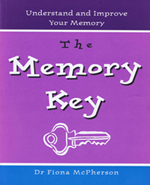Common everyday memory strategies
The most frequently used everyday memory strategies are:
- writing calendar or diary notes
- putting things in a special place
- writing reminder notes
- writing shopping lists
- using face-name associations
- mentally rehearsing information
- using a timer
- asking someone else to help
Of these, all but two are external memory aids. With the exception of face-name associations, mnemonic strategies (the foundation of most memory-improvement courses) are little used.
How effective are these strategies?
In general, external aids are regarded as easier to use, more accurate, and more dependable. In particular, external aids are preferred for reminding oneself to do things (planning memory). Mental strategies however, are equally preferred as retrieval cues for stored information. The preferred strategies are mentally retracing (for retrieving stored information) and mentally rehearsing (for storing information for later retrieval).
Note that these preferred strategies are not those that are most effective, but those strategies that are least effortful. The popularity of asking someone to help you remember has surprised researchers, but in this context it is readily understandable — asking someone is easiest strategy of all! It is not, however, particularly effective.
Older people in particular, are less inclined to use a strategy merely because it is effective. For them it is far more important that a strategy be familiar and easy to use.
Learning effective strategies does require effort, but once you have mastered them, the effort involved in using them is not great. The reason most people fail to use effective strategies is that they haven’t mastered them properly. A properly mastered skill is executed automatically, with little effort. (see Skill learning)
